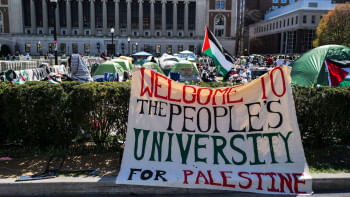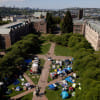Student protests in the US: A déjà vu of 1968

Anyone from my generation would remember how the protests by university students all across the United States in 1968, and the strong-armed response from law enforcers, ended President Lyndon Johnson's plans to run for re-election and marked the beginning of the end of the US's bloody war in Vietnam. That anti-war student movement was a watershed in the country's political history. It was the period of counterculture where anti-establishment sentiments were vocally and virulently expressed by the society's younger generation. The classic film The Trial of the Chicago 7, based on real events, is a most graphic reminder of that turbulent and dark period, where the court chose not to remain impartial and even the judge himself became a party to intimidating defence witnesses.
The world is now witnessing a return to similar student protests, in some of the most well-known universities in the US, this time against Washington's inability to stop Israeli genocide against Palestinians, many of the victims being children and women. This is because of the establishment's "ironclad" and unqualified support for Israel, a policy that cuts across the entire political spectrum of the country, the likes of Independent Senator Bernie Sanders being the very miniscule exceptions. The younger generation finds such a biased policy unethical, immoral and unjust, and hence demands course correction.
The students' protests have nothing to do with anti-Semitism, a narrative that successive Israeli governments and the powerful Jewish lobby in the US have cultivated with deadly effect. It must be noted that many among the protesters happen to be Jewish. The protests have everything to do with the quest for justice for the people of Palestine, who have been victims of illegal occupation, continuous suppression and utter injustice at the hands of Israel for more than seven decades, while the West looked on with deafening silence, even condoning them more often than not.
What is shocking this time, though, is the high-handed reaction from the leadership of the universities. Faculty members who support the protests have lost their jobs; hundreds of students, and counting, have been arrested and expelled; police are being called in to confront the protesters. This is happening even when the protests have largely been peaceful. The actions of the university leaderships, however, have not quelled the protests; if anything, they have generated a stronger and wider movement—not just by students, but by a larger segment of society, from coast to coast, seeking justice and end of genocide.
The Constitution of the United States guarantees freedom of assembly and the right to free speech. These are well-founded values that the US and other Western countries profess loudly when it comes to a "value-based world order." It seems that the university authorities clearly look at things differently when it comes to Israel. Revelations that many of the universities in the US receive sizeable monetary endowments from businesses/companies with links to Israel and some other Jewish groups seem to be the main cause why the authorities choose to ignore provisions of the country's constitution written by its very founding fathers.
A university is not just a place where one goes to get a degree; it is meant to be a centre of excellence. Its very name suggests that it is the vortex where the universal values of free thinking, justice and ethics are nurtured and embedded in the minds of the youth. It is where the greatness of innovation and creativity are encouraged and rewarded. In the land of the free and the home of the brave, a university cannot be a place where the right to speak out freely against visible injustice is culled, and the bravery of condemning genocide is met with harsh punitive measures. Such actions by the universities involved strike at the very roots of democracy and humanity—things the United States so vocally professes elsewhere but stops far short every time Israel is at the centre of the talking point.
The strong-arm tactics of these universities deserve condemnation in the strongest possible language. Are the leadership of these universities blind to what is happening in Gaza today? Are they deaf to the frantic cries for help of a six-year-old Palestinian boy in Rafah before he was silenced by an Israeli bomb?
The youth-led anti-war movement of the 1960s and 1970s had a seismic impact on the US's body politic. What the current movement, which is fast acquiring a global character, will mean for the policymakers in Washington remains to be seen. The first one led to Vietnam's emergence as a nation-state after decades of fighting. One hopes the sequel will lead to a similar outcome for the Palestinians, and an end to granting impunity to Israel for all its crimes.
Shamsher M Chowdhury, Bir Bikram, is a former foreign secretary of Bangladesh and president of Trinamool BNP.
Views expressed in this article are the author's own.
Follow The Daily Star Opinion on Facebook for the latest opinions, commentaries and analyses by experts and professionals. To contribute your article or letter to The Daily Star Opinion, see our guidelines for submission.

 For all latest news, follow The Daily Star's Google News channel.
For all latest news, follow The Daily Star's Google News channel. 










Comments